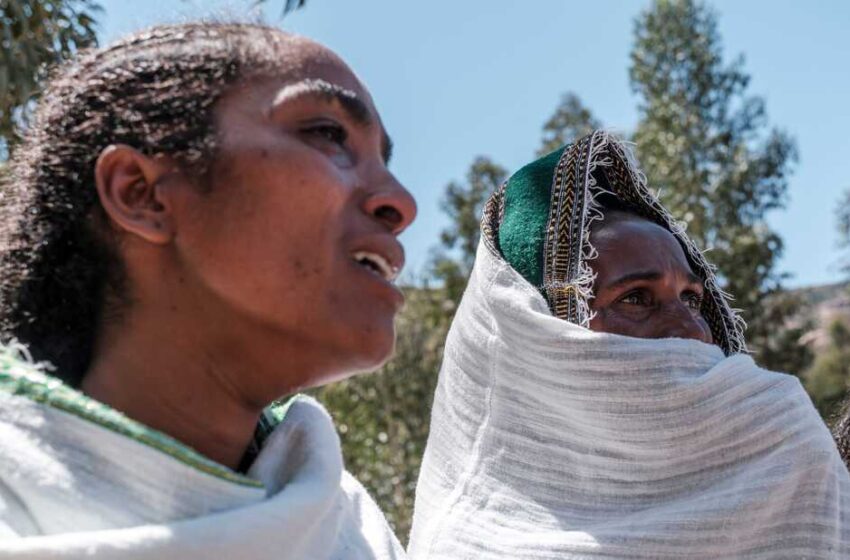
Ethiopia’s Ultimate Sin – Being Tigrayan
Source: Omna Tigray
Ethiopia was once a country where people knew it was a sin to lie, kill, and steal, or so we thought. But today, there is one sin that surpasses them all: being born or raised in the northernmost Ethiopian region of Tigray or having any connection to Tigray at all. I did not realize the extent of this sin until Tigrayans who were born and raised in Ethiopia’s capital Addis Ababa, who know as much about Tigray as they do a foreign country, were prosecuted for their association.
It has been over a year since the genocidal war on Tigray has displaced people from their homes and taken lives. For those who thought themselves physically and mentally far from the war, it has found its way to them.
With a government whose main selling point has been being different from its predecessors, the unlawful detention of anyone labeled as “Tigre” [Amharic word for Tigrayans] sure makes time travel possible.
When asked why Tigrayans were being detained, “for questioning” is the standard line uttered by security personnel as they take individuals from their homes. For days, weeks, months, and still to this day, many Tigrayan families have no idea about their children’s whereabouts. The basis for their detention was for no other reason than being found ‘Tigre’: a label most were born into.
The majority of Tigrayans who are detained or arrested end up so at the hands of their own neighbors or co-workers. In a country that has long prided itself on its diversity of more than 80 ethnicities with different languages, speaking Tigrigna is painting a target on one’s back.
From what I observe, there are three ironies in present-day Ethiopia.
First, regular folk from other regions accuse the people of Tigray for wanting to hold on to their Tigrayan identity, language, and culture, regardless of where they live. They view this as Tigrayans’ wanting to differentiate themselves from other Ethiopians. But until recently, that was far from the truth. The majority of Tigrayans believed in the potential of the Ethiopian state, one that could find strength in diversity.
Today, that accusation brings me to this question: when everything about you, including your very existence, paints you as a criminal, how exactly are you supposed to be one with your accusers?
The second irony is that Tigray and Tigrayans have wrongly been accused of profiting from the previous government—the Ethiopian People’s Revolutionary Democratic Front (EPRDF). However, similar to many rural parts of Ethiopia, the majority of the Tigray region hardly reaped benefits from the development Ethiopia experienced in the last two decades.
The elite in Ethiopia, including Tigrayans, may have benefited from the country’s undeniable growth, but many Tigrayans in Tigray and across Ethiopia experienced poverty the same way other Ethiopians did. Ethiopians could have seen it if they had not been blinded by pure hatred. There were millions of Tigrayans working to break the cycle of poverty during Ethiopia’s fastest economic growth period. And today, all these efforts have ceased with the genocidal war on Tigray. Tigrayans are now facing the worst famine and humanitarian crisis Ethiopia has ever experienced.
Today, doctors and medical students in Mekelle talk about one piece of bread being rationed as an entire meal. Civil servants and journalists are having to work without pay. Mothers are having to dodge bombs and bullets, carrying their children on their backs. I cannot help but wonder where Tigrayans are saving that first-class ticket that they are supposedly wealthy enough to have per most Ethiopians. When I see hospitals, homes, and roads in the aftermath of the Ethiopian and Eritrean invasion, I still wonder when Tigray’s proclaimed wealth will come through.
The government of Ethiopia and Ethiopians alike, are intentionally painting with broad strokes all Tigrayans as members of the Tigray’s People Liberation Front (TPLF) under the former EPRDF system. Lost in this lack of distinction is that former leaders are not the people of Tigray who have done nothing more than being Tigrayan.
The third irony is the following: Tigrayans across Ethiopia who have the luxury of not starving amidst a man-made famine and genocidal war are fleeing the country any chance they get. I recall an acquaintance once asking, “What person who isn’t a criminal runs?” At the time, out of emotional exhaustion, I didn’t answer. But it was one of those moments I wish I had immediately answered.
Who in their right minds would voluntarily become a sitting duck? The way things keep escalating in the country, I can honestly say it’s only a matter of time before you are found guilty inside a country that is looking for a reason, any reason at all. So sure, fleeing can paint you as guilty, but isn’t it better to appear guilty from a safe distance? What is the other option?
The government and even most Ethiopians have already made up their minds about you anyway.
This mindset did not emerge from nowhere. It was cultivated on purpose by the Ethiopian state and so-called political elites and religious leaders, who used all media outlets at their disposal. They disseminated hate speech and genocidal rhetoric. It is common nowadays to hear Tigrayans referred to or addressed using derogatory names and terms. Why? Because the day they were born in Tigray, or the day they were born from Tigrayan parents, or the day their grandparents spoke their two first Tigrigna words while the grandchildren were not even conceived – that day was the day they signed off their right to innocence. The whole “innocent till proven guilty” notion doesn’t apply for Tigrayans.
They were born sinful when they were born as Tigres in today’s Ethiopia. I was born sinful when I was born among Tigres.
